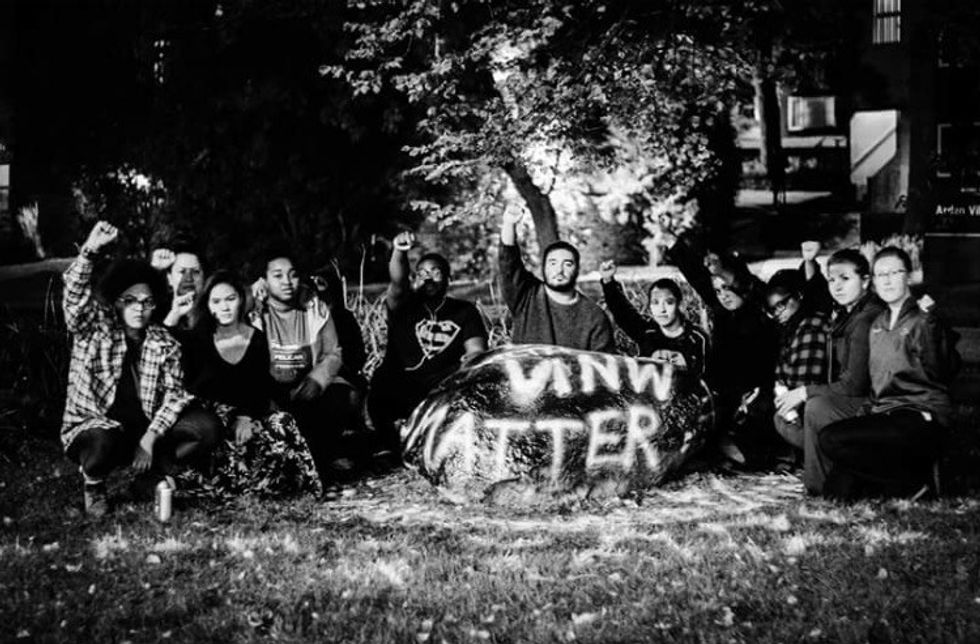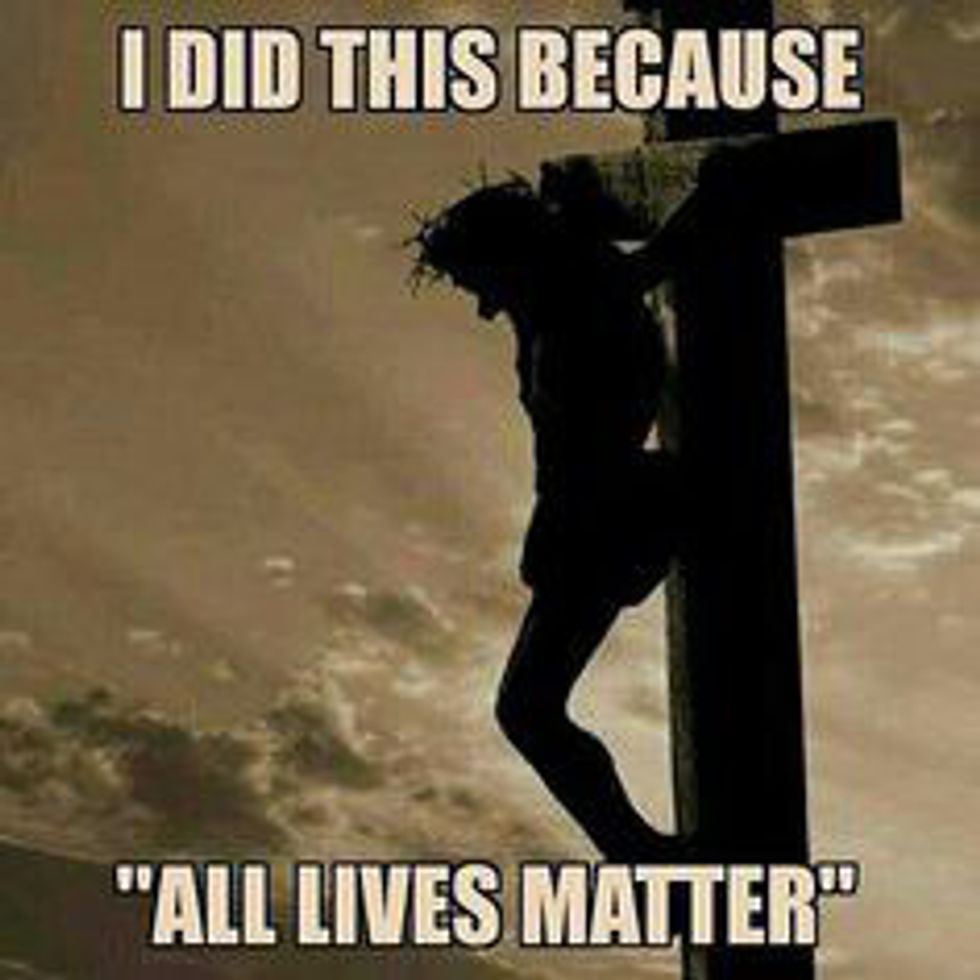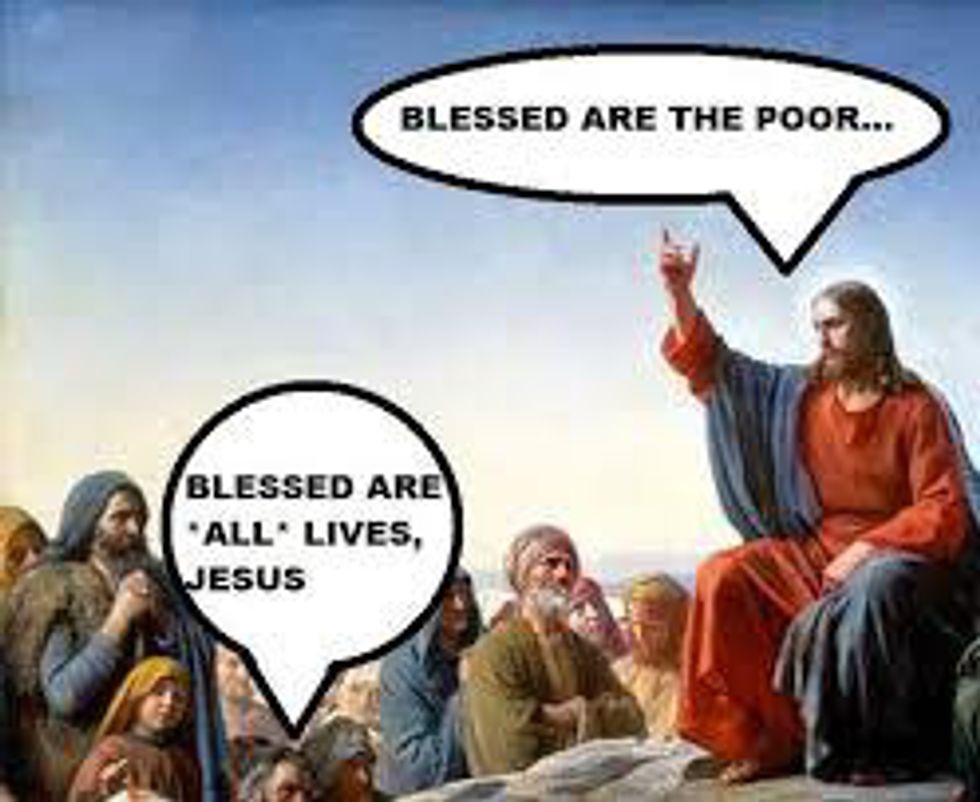Most of what I’m about to say has already been said. But now it’s time for me to say it.
Last week, the controversial topic Black Lives Matter touched home on campus at the University of Northwestern Saint Paul. On Wednesday, a group of student activists for equality and awareness of racial injustices painted the rock--a campus icon painted recreationally to celebrate events or promote ideas--with the slogan "Black Lives Matter." A member of UNW's facilities staff covered it, citing the rock's general ban regarding political causes. The group later gained support from campus' Student Life deans, and the message was repainted. Students and staff alike were thrilled to be able to voice their pain and concerns in a way they hoped would generate discussion and promote awareness.
Within an hour, the rock was painted again.
(Bear in mind that the unspoken campus guideline for painting the rock is that a full 24-hours must pass after one image appears before it can be painted over. This is meant as a courtesy to show our fellow students respect.)
But this time, within an hour, a line appeared over the word "Black" and a broad "All" was strewn over the top.
A week later, the same scenario played out on our neighbor school Bethel University's campus. A group of students painted their rock with a similar message as an act of solidarity between the BLM movements on each campus. The next night, it too was painted over, this time with the hashtag #bluelivesmatter and a statement that Black Lives Matter is racist.
Here's why this is a problem.
This issue is not about freedom of speech. It's not about white people feeling bullied because they're unable to express their opinions regarding someone else's pain. It's not even about which lives matter. It's about which lives don't.
And right now, black lives aren't mattering.
The evidence is all around us, if we only choose to see it. From acts of outrageous racial profiling such as the shootings of innocent, unarmed black men to prejudices buried so deeply beneath our skin that we aren't even aware of them--our country has a problem and its people are hurting.
Now, I am not disputing the truth of the statement "All Lives matter." I actually agree 100%. All lives do matter. Jesus did die for all. Obviously. And I understand the appeal of such a statement. "All" is less exclusive. "All" includes us (white people) in their (black people) message. "All" gives the appearance of unity. But to individuals of color in our country, "All" is just another way to silence them. "All" is the oppression of their beliefs, the minimization of their pain, and the discrimination against their voice.
Recently, I've seen an increase in the number of Christian-themed All Lives Matter memes. They cite Christ's universal love and his death for all as support for their choice of words. But what they're missing is the heart of Christ's message.
Jesus' heart was for the poor, oppressed, forgotten, and hurting, the marginalized, the broken, the outcast, and the hated members of society. He specifically addresses these people in sermons, reaches out to them as individuals, shows them love and cares for their needs. He sees them. He hears them. And it's time for Christians to start doing the same.
An image that has been convicting me in regards to this issue is Jesus' parable of the Good Samaritan.
Luke 10:25-37 NIV
25 On one occasion an expert in the law stood up to test Jesus. “Teacher,” he asked, “what must I do to inherit eternal life?”
26 “What is written in the Law?” he replied. “How do you read it?”
27 He answered, “‘Love the Lord your God with all your heart and with all your soul and with all your strength and with all your mind’[a]; and, ‘Love your neighbor as yourself.’[b]”
28 “You have answered correctly,” Jesus replied. “Do this and you will live.”
29 But he wanted to justify himself, so he asked Jesus, “And who is my neighbor?”
30 In reply Jesus said: “A man was going down from Jerusalem to Jericho, when he was attacked by robbers. They stripped him of his clothes, beat him and went away, leaving him half dead.31 A priest happened to be going down the same road, and when he saw the man, he passed by on the other side.32 So too, a Levite, when he came to the place and saw him, passed by on the other side. 33 But a Samaritan, as he traveled, came where the man was; and when he saw him, he took pity on him.34 He went to him and bandaged his wounds, pouring on oil and wine. Then he put the man on his own donkey, brought him to an inn and took care of him.35 The next day he took out two denarii and gave them to the innkeeper. ‘Look after him,’ he said, ‘and when I return, I will reimburse you for any extra expense you may have.’
36 “Which of these three do you think was a neighbor to the man who fell into the hands of robbers?”
37 The expert in the law replied, “The one who had mercy on him.”
Jesus told him, “Go and do likewise.”
Now, I fully acknowledge that I am among the least qualified people to speak on this topic. But that does not change the fact that it is time for us to do something. Respond to the hurting people around you. Don't let your interest last as long as a hashtag is trending on Facebook. Don't be content to like a status and then scroll past. That's what I've been doing. But it's not what Jesus is calling us to.
Jesus is calling us to see our brothers and sisters lying on the side of the road, bloody and beaten and hurting, and help them. Seek His guidance on this issue, hear how He is calling you to respond. Listen, facilitate discussion, stand in support. Don't contribute to their oppression by silencing them with generalized calls for equality. Don't shy away from taking a stand for fear of inflammatory language sparking discussion. Advocate for them. See them. Hear them.
Show them that their lives really do matter.









 Photo by
Photo by  Photo by
Photo by  Photo by
Photo by 



















